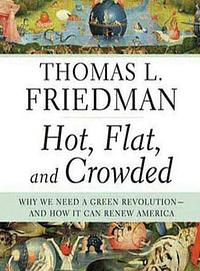Take a photo of a barcode or cover
120 reviews for:
Hot, Flat, and Crowded: Why We Need a Green Revolution – and How It Can Renew America
Thomas L. Friedman
120 reviews for:
Hot, Flat, and Crowded: Why We Need a Green Revolution – and How It Can Renew America
Thomas L. Friedman
Um... I'm on page 3 and bored out of my mind.
Alright, I don't feel so bad- out of my book group, the three who came admitted that they didn't read this, and the other guy outright told me he would not be coming- and he's always there.
It's not an awful book- but these were the common complaints:
1. It was too scary- people don't want doomsdaying, they want solutions- and upfront.
2. It was boring.
3. It was not made relevant to our lives.
4. Some of his "solutions" were overly simplistic (fix the energy problem in Africa, and then AIDS won't be a problem? I've oversimplified, but that was one that the group just didn't buy)
So what I did was read my favorite Nancy Pearl-ism (from Book Lust): (Paraphrased)Don't finish a book that you don't enjoy just because you feel obligated to read it. If "everyone" loves a book, but after 70 pages you want to beat yourself over the head with the book, DON'T KEEP READING!! There are too many other books out there that you will fall in love with- don't waste your time on ones you don't. You can come back to it later, but don't feel obligated!
End of rant.
Alright, I don't feel so bad- out of my book group, the three who came admitted that they didn't read this, and the other guy outright told me he would not be coming- and he's always there.
It's not an awful book- but these were the common complaints:
1. It was too scary- people don't want doomsdaying, they want solutions- and upfront.
2. It was boring.
3. It was not made relevant to our lives.
4. Some of his "solutions" were overly simplistic (fix the energy problem in Africa, and then AIDS won't be a problem? I've oversimplified, but that was one that the group just didn't buy)
So what I did was read my favorite Nancy Pearl-ism (from Book Lust): (Paraphrased)Don't finish a book that you don't enjoy just because you feel obligated to read it. If "everyone" loves a book, but after 70 pages you want to beat yourself over the head with the book, DON'T KEEP READING!! There are too many other books out there that you will fall in love with- don't waste your time on ones you don't. You can come back to it later, but don't feel obligated!
End of rant.
"To talk about climate change is not to talk about politics."
Depressed:
I care deeply about the environment. I make changes to my life when I learn new things. I try hard to do my part, I don't try to assume that I can change people's minds, but I do what I can because of what I learn. Maybe I've gotten a little soft around the edges of my convictions, because I don't always try to recycle as much as I can. I don't want to be a burden to those around me. So how do I stop that kind of thinking?? Start listening to Hot, Flat and Crowded. I immediately had a renewed energy to be more annoying to those I live with, to learn more about recycling, to recycle EVERYTHING I can. Why put stuff in a landfill?? Why be lazy?
Overall this book lays out a compelling argument for America's need to change the way they view the environment and its resources. Friedman also explains why change is so hard to come by through legislation. He argues that in the long run being 'green' is the best option for everyone and that the cost now will outweigh the cost of running out of resources.
He discusses the need to bring electricity to Africa, but doing that will only increase the energy problem... He argues that it is unreasonable for us to try to limit other countries in their growth because of their cost on the environment when America has been able to grow without thinking of the consequences for years. All the more reason that America should focus its resources on the ever growing energy and resource problem that will arise as poorer nations join the 'flat' world increasing the environmental problems at hand.
Friedman's last argument compares the Civil Rights movement as an example of how Americans need to push politicians into action. He said we cannot be driven to too much despair or hope because both extremes will prevent us from acting to make a difference. '10 easy steps' to saving the planet isn't real change. The 'green' movement is really just a consumer ploy at the moment and we should really be trying to do as much as possible and not just the bare minimum.
It is a compelling argument, one I believe in, but it's still confusing where to start without becoming a lobbyist or working for the EPA.
My immediate reaction is to be saddened by all that is not being done and the 'everything will turn out okay' attitude some seem to have, but I am ultimately encouraged that change will eventually come, probably when it is too painful to avoid. I can continue setting my course in the direction I am challenged to go.
Good quotes:
"the future is with us, it's just not widely distributed yet"
"green is still an option, but not necessity"
"yes to wind turbines, but not in my back yard"
Personal implications of reading:
The book definitely renewed my theory of why have kids if we're slowly running out of natural resources and ice caps and fresh water dolphins' It sounds like a sci-fi movie where we must move to mars. Those aren't real options right now, and then we will just destroy that planet. I saw Pandorum and Wall-E, and I don't want to leave an unsustainable planet, or even house, to my pretend children.
Depressed:
I care deeply about the environment. I make changes to my life when I learn new things. I try hard to do my part, I don't try to assume that I can change people's minds, but I do what I can because of what I learn. Maybe I've gotten a little soft around the edges of my convictions, because I don't always try to recycle as much as I can. I don't want to be a burden to those around me. So how do I stop that kind of thinking?? Start listening to Hot, Flat and Crowded. I immediately had a renewed energy to be more annoying to those I live with, to learn more about recycling, to recycle EVERYTHING I can. Why put stuff in a landfill?? Why be lazy?
Overall this book lays out a compelling argument for America's need to change the way they view the environment and its resources. Friedman also explains why change is so hard to come by through legislation. He argues that in the long run being 'green' is the best option for everyone and that the cost now will outweigh the cost of running out of resources.
He discusses the need to bring electricity to Africa, but doing that will only increase the energy problem... He argues that it is unreasonable for us to try to limit other countries in their growth because of their cost on the environment when America has been able to grow without thinking of the consequences for years. All the more reason that America should focus its resources on the ever growing energy and resource problem that will arise as poorer nations join the 'flat' world increasing the environmental problems at hand.
Friedman's last argument compares the Civil Rights movement as an example of how Americans need to push politicians into action. He said we cannot be driven to too much despair or hope because both extremes will prevent us from acting to make a difference. '10 easy steps' to saving the planet isn't real change. The 'green' movement is really just a consumer ploy at the moment and we should really be trying to do as much as possible and not just the bare minimum.
It is a compelling argument, one I believe in, but it's still confusing where to start without becoming a lobbyist or working for the EPA.
My immediate reaction is to be saddened by all that is not being done and the 'everything will turn out okay' attitude some seem to have, but I am ultimately encouraged that change will eventually come, probably when it is too painful to avoid. I can continue setting my course in the direction I am challenged to go.
Good quotes:
"the future is with us, it's just not widely distributed yet"
"green is still an option, but not necessity"
"yes to wind turbines, but not in my back yard"
Personal implications of reading:
The book definitely renewed my theory of why have kids if we're slowly running out of natural resources and ice caps and fresh water dolphins' It sounds like a sci-fi movie where we must move to mars. Those aren't real options right now, and then we will just destroy that planet. I saw Pandorum and Wall-E, and I don't want to leave an unsustainable planet, or even house, to my pretend children.
A good book that talks about climate change and a crisis in America. He argues that the world's problem is that it's getting hot, flat and crowded and that convergence is driving a lot of really bad trends. America also faces a crisis. A emotional, phyisical and international crisis. One quote in the book mentions:
"It's like jumping off an 80-story building. For 97 stories you feel as if you're flying. That's where the world is now."
He then goes on to describe that America should solve it's crisis by getting entrepreneurial about green living and green technology and if America solves its problem, it will move on to solve the world's problems too.
It also discusses global warming and oil and their interdependence. There is no pulling punches in this section. Global warming is here due to the amount of carbon in the atmosphere and while people dispute some of the implications of this, it is a fact that we're putting more and more carbon into the atmosphere. There's also an interesting section about oil and how the oil rich countries become increasingly more anti-american and anti-democratic as the price of oil increases.
It's worth a read. Anyone else read it? If so, what are your thoughts?
"It's like jumping off an 80-story building. For 97 stories you feel as if you're flying. That's where the world is now."
He then goes on to describe that America should solve it's crisis by getting entrepreneurial about green living and green technology and if America solves its problem, it will move on to solve the world's problems too.
It also discusses global warming and oil and their interdependence. There is no pulling punches in this section. Global warming is here due to the amount of carbon in the atmosphere and while people dispute some of the implications of this, it is a fact that we're putting more and more carbon into the atmosphere. There's also an interesting section about oil and how the oil rich countries become increasingly more anti-american and anti-democratic as the price of oil increases.
It's worth a read. Anyone else read it? If so, what are your thoughts?
I recently saw Thomas Friedman speak and he was a lot more interesting speaking than writing. I think the issue perhaps is length. This book felt very repetitive and longer than it needed to be. Particularly the first half, but the majority, was about how much trouble we are in. Which is not a bad thing - but I was more interested in the way forward. Perhaps if they were more interspersed? Here is a section on a problem. Here is a potential solution. Rather than half of book of all problems and then some solutions? I agree with his call for America to emerge as the green-leader.
I wanted to love this book! Some of his ideas were really interesting. But I couldn't get into his style of writing. It was redundant and at times very boring. For a topic I'm really interesting in, I was surprised!
Fascinating look at what's going on with global warming, and the immediate impact on the planet.
Friedman does a great job making it interesting and understandable, while making it clear something must be done, now, and on a mass scale.
The only thing I didn't like was his tendency to over-explain - not just with two or three examples, but four or five in many cases. It made the book a lot longer, and in some ways more tedious. However, if one example didn't jump out, certainly another one did, with every situation he covered.
Friedman does a great job making it interesting and understandable, while making it clear something must be done, now, and on a mass scale.
The only thing I didn't like was his tendency to over-explain - not just with two or three examples, but four or five in many cases. It made the book a lot longer, and in some ways more tedious. However, if one example didn't jump out, certainly another one did, with every situation he covered.
There is a LOT of good stuff in here, but I couldn't read much at one sitting, since it was pretty depressing .. I had to turn it back in to the library before I could really get into the good parts about how to FIX our energy and environmental problems. I'll pick it back up one day.
One of the most powerful, persuasive and important books I have ever read. Should be required reading for EVERYONE, especially politicians, policymakers and business people.
“A place where birds don’t fly is a place where people don’t mix, ideas don’t ged sparked, friendships don’t get forged, stereotypes don’t get broken, collaboration doesn’t happen, trust doesn’t get built, and freedom doesn’t ring. That is not the kind of place we want America to be. That is not the kind of place we can afford America to be.”
An intriguing book. An important book. Unfortunately, there is a tone to Friedman's writing which I find preachy and slightly condescending, but there is indeed a great deal of very good information in the book which should be absorbed. Anyone who finds compelling President Obama's views on climate change, economic revitalization, and the possible peril facing us in the near future should humanity fail to address our impact on the planet will find there is a great deal of very specific and pointed content in this book. There are also some very reasonable suggestion for how change could be implemented. It is worth reading, and worth thinking about, even if the author at times drives his point as if from the pulpit.





